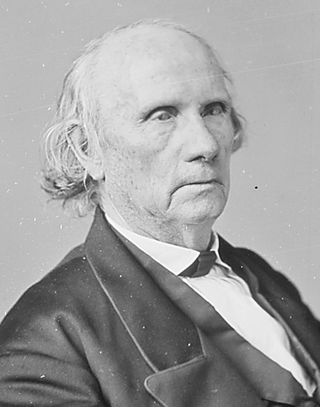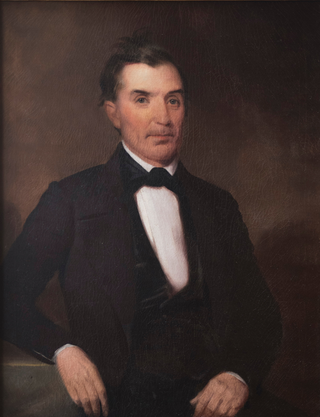
Alexander Baring, 1st Baron Ashburton was a British politician and financier, and a member of the Baring family. Baring was the second son of Sir Francis Baring, 1st Baronet, and of Harriet, daughter of William Herring.

James Guthrie was an American lawyer, plantation owner, railroad president and Democratic Party politician in Kentucky. He served as the 21st United States Secretary of the Treasury under Presidents Franklin Pierce and James Buchanan, and then became president of the Louisville and Nashville Railroad. After serving, part-time, in both houses of the Kentucky legislature as well as Louisville's City Council before the American Civil War, Guthrie became one of Kentucky's United States senators in 1865. Guthrie strongly opposed proposals for Kentucky to secede from the United States and attended the Peace Conference of 1861. Although he sided with the Union during the Civil War, he declined President Abraham Lincoln's offer to become the Secretary of War. As one of Kentucky's senators after the war, Guthrie supported President Andrew Johnson and opposed Congressional Reconstruction.

Abraham Bedford Venable was a Virginia lawyer, planter and politician who served in the U.S. House of Representatives and briefly as U.S. Senator, as well as in the Virginia House of Delegates.

Isaac Franklin was an American slave trader and plantation owner. Born to wealthy planters in what would become Sumner County, Tennessee, he assisted his brothers in trading slaves and agricultural surplus along the Mississippi River in his youth, before briefly serving in the Tennessee militia during the War of 1812. He returned to slave trading soon after the war, buying enslaved people in Virginia and Maryland, before marching them in coffles to sale at Natchez, Mississippi. He introduced John Armfield to the slave trade, and with him founded the Franklin & Armfield partnership in 1828, which would go on to become one of the largest slave trading firms in the United States. With a base of operations in Alexandria, D.C., the company shipped massive numbers of the enslaved by land and sea to markets at Natchez and New Orleans.

Martin D. Hardin was a politician and lawyer from Kentucky. Born in Pennsylvania, his family immigrated to Kentucky when he was still young. He studied law under George Nicholas and commenced practice at Richmond, Kentucky. His cousin, future U.S. Representative Benjamin Hardin, studied in his law office. He represented Madison County in the Kentucky House of Representatives for a single term.

William Andrew Quarles was a Tennessee lawyer, politician, railroad executive, and a general in the Confederate States Army during the American Civil War.
Peter [de] Thellusson was a Genevan businessman and banker who settled in London, and became a British subject in 1762. He amassed a fortune through commerce and, when he died in 1797, he owned more than 4,000 acres of land in England. His descendants built the new Brodsworth Hall in South Yorkshire, which is maintained by English Heritage.
Nicholas Battaile Fitzhugh was a Virginia lawyer and politician who became a United States circuit judge of the United States Circuit Court of the District of Columbia after representing Fairfax County in the Virginia House of Delegates.
Joshua Lewis was a judge of the Superior Court of the Territory of Orleans and, after Louisiana became a state, the 1st Judicial District Court of that state.

Robert Reed Church Sr. was an American entrepreneur, businessman and landowner in Memphis, Tennessee, who began his rise during the American Civil War. He was the first African-American "millionaire" in the South. Church built a reputation for great wealth and influence in the business community. He founded Solvent Savings Bank, the first black-owned bank in the city, which extended credit to blacks so they could buy homes and develop businesses. As a philanthropist, Church used his wealth to develop a park, playground, auditorium and other facilities for the black community, who were excluded by state-enacted racial segregation from most such amenities in the city.
Events from the year 1869 in the United States.

Thomas Williamson Means was a settler of Hanging Rock, Ohio, and a native of South Carolina. Together with his brother Hugh he became notable in Ashland, Kentucky, after he built the Buena Vista Furnace and became a director of the Kentucky Coal, Iron & Manufacturing Company. He was also the father of Ashland Mayor John Means. Means owned furnaces in Alabama, Kentucky, Ohio, and Virginia.

Robert Monckton-Arundell, 4th Viscount Galway, PC KB was an English peer and politician.
The Gurneys were an influential family of English Quakers, who had a major part in the development of Norwich, England. They established Gurney's Bank in 1770, which merged into Barclays Bank in 1896. They established successful breweries. A number of family members were abolitionists. Members of the family still live in the United Kingdom.
Isaac H. Hilliard (1811-1868) was an American planter and cotton factor in the Antebellum South. He was an advocate of the Confederate States of America. During the American Civil War of 1861–1865, he moved his family slaves to Texas and later Louisiana. After the war, he was pardoned by President Andrew Johnson and liquidated his cotton-factoring business. His Arkansas plantation was inherited by his sons.

Fairfax is a historic mansion in White Pine, Jefferson County, Tennessee, USA.

The Lawson D. Franklin House is a historic mansion in White Pine, Tennessee, United States.

William Allen Montgomery was an American lawyer, planter and Baptist minister. Trained as a lawyer in Tennessee, he was a cotton planter in Texas in the 1850s and served as a Confederate chaplain in the American Civil War. He served as the President of Carson–Newman University from 1888 to 1892.

Judge Thomas Jefferson Latham was an American lawyer and businessman. Growing up in rural Weakley County, Tennessee, in the Antebellum South, he became a lawyer and remained neutral during the American Civil War. In the post-bellum era, he served as the debt receiver of the City of Memphis, Tennessee, and the president of the Memphis Water Company. He was an investor in land development in Tennessee and coal mining in Alabama. By the time of his death, he was a millionaire.
Henry Washington was an American planter and legislator who served one term as a delegate from Prince William County in the Virginia House of Delegates before moving to Shelbyville, Kentucky and later what became Limestone County, Alabama.













